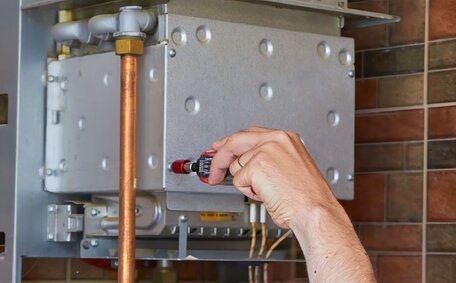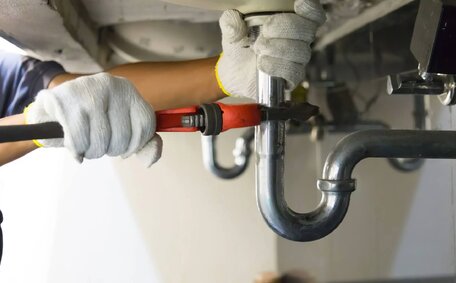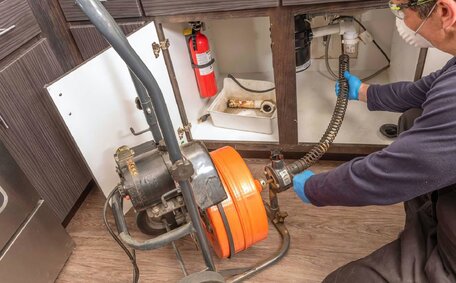Understanding Blocked Sewer Lines
Your home’s main sewer line is vital for wastewater removal and ensuring smooth drainage, with its condition significantly affecting drain performance. A blockage in the main sewer line can cause water to back up into your home, leading to flooding, property damage, and health hazards.
Common causes of sewer line blockages include:
- Tree roots – Adjacent tree roots can infiltrate and obstruct your home’s main drain in search of moisture and nutrients.
- Grease and oil buildup – Fats, oils, and grease that enter your drain can accumulate, causing thick blockages.
- Foreign objects – Flushing anything besides toilet paper can cause obstructions, like wipes, feminine products, and paper towels.
- Pipe damage – Cracks, misalignments, and deteriorating pipes often contribute to clogs as debris accumulates at these fault points.
The repercussions of sewer line blockages can manifest as:
- Sewage threatening to invade your sink is a distress signal that shouldn’t be ignored
- Sewage in your yard signals an overwhelmed sewer system and a clear indication of a blockage.
- Foul sewer odours often signal blockages, highlighting the need for system maintenance.
- Standing water and soggy soil around your floor drains and sewer outlets can indicate a blockage main sewer line
- Severe health risks arise from sewage backups caused by main sewer line blockages, resulting in contact with raw sewage.
Early detection of a blocked sewer is crucial, allowing a professional plumber to intervene before water backing up causes substantial damage. Awareness of common blockage causes and indicators can help you anticipate potential problems.
Immediate Signs of a Blockage
Promptly recognising a blocked sewer drain is essential to reduce the risk of flooding and property damage. Watch for these warning signs, like water backing up in the shower, which suggest a potential blockage in your sewer:
- Water backing up into your shower, bathtub, and other drains, such as sinks and toilets, indicates a sewer system problem.
- Gurgling noises coming from plumbing fixtures
- Sewage odours inside or around your house
- Toilets with sluggish flushing or overflow during use
- Standing water around your sewer cleanout or floor drain signifies that immediate attention is crucial for a clean out and may be a definitive sign blocked in your main sewer line
Should you observe these symptoms, promptly engage a professional plumber to eliminate the blockage before it worsens. Acting swiftly helps protect your property by minimising costs and health risks associated with sewage that may have backed up into your fixtures.
Subtle Signs of a Blockage
In addition to overt blockage indications, pay attention to subtle changes within your main sewer system clogged up to watch for that could indicate issues:
- A shower or bathtub drain that drains slowly or often needs plunging
- Noticeable changes in water level, pressure, or drainage time could indicate a clogged main sewer line, especially if one fixture is affected by the use of another.
- Persistent problems suggest a more severe blockage in the main sewer; toilet clogs that temporarily clear may recur within days or weeks
- New moisture or lush vegetation outside could indicate a blocked sewer pipe along your sewer line’s path
Though easy to overlook, these signs suggest a blockage your sewer line, partial blockages, pipe damage, or root invasion impeding wastewater flow. If unchecked, minor clogs can escalate into a significant blockage in the main sewer. Inspecting the less visible portions of your sewer lines we need can reveal cracks allowing roots or sediment to gather and cause problems further down the line.
It’s best to contact your plumber if you suspect your drain has an issue, to have your main drains fully cleared and the system checked for flaws that require pipe repairs or replacement.
Clearing a Blockage
Clearing a blocked sewer line effectively necessitates professional tools and expertise. Homeowners should do well to avoid dangerous DIY methods like using caustic drain cleaners or snaking a drain without proper training.
Professional Drain Cleaning
Industrial strength vacuums effectively extract debris from the sewer lines.
Hydro Jetting
Hydro jetting employs powerful, high-pressure water streams to sweep away debris from your pipes, effectively cleaning accumulated material. It effectively clears years of buildup, removing grease, soap residue, and waste. It can dislodge tough clogs from tree roots or hardened debris.
Cable Machines (Snaking)
A powered auger, or snake, feeds a rotating metal cable down the line to dislodge clogs. The rotating head of the auger breaks apart stubborn clogs and facilitates the removal of debris. This method works on clog main sewer line issues, such as partial clogs from grease, waste, and small roots more than.
CCTV Pipe Inspection
Post-cleaning, sewer cameras inspect the condition of the pipes, detecting any remaining issues. They identify breaks, cracks, misalignments, and a clogged sewer or remaining obstructions. This helps plumbers determine if repairs, replacement, or further cleaning are needed.
Professionals equipped with specialised tools and knowledge can accurately address and fix your sewer blockages. They can accurately diagnose issues, comprehensively clear blockages, and make repairs for smooth drainage.
Preventing Future Blockages
There are several practical steps homeowners can take to help prevent future main sewer drain blockages:
Properly Dispose of Waste
Ensure only toilet paper and human waste go down the main drain, avoiding blockages. Opt for a strainer in your shower and your washing machine outlet to catch hair and lint.
Scrape food scraps, fats, oils, and grease into the garbage rather than rinsing down the drain. And never flush wet wipes, feminine hygiene products, dental floss, or paper towels as these do not break down.
Clean Drain Stoppers and Use Enzyme Treatments
For homes with a septic system, resolving your problem with slow drains may involve monthly cleaning of the stoppers from your kitchen sink and tub drains to remove built-up hair and soap scum, and a septic tank maintenance routine should be considered. To maintain clear pipes, pour a baking soda and vinegar mix down the drain, let it sit for 15 minutes, then flush with hot water. Use a septic-safe enzyme treatment monthly to break down organic materials.
Inspect and Maintain Your Plumbing
Check for root invasion or damage by scoping your sewer lines every year or two. Repair any pipe flaws, misalignments, cracks, or intruding roots right away. Addressing minor issues early on avoids major blockages down the road.
Hire Professionals for Routine Maintenance
Have a reputable plumber perform preventative maintenance every 12-24 months. A full sewer cleaning using hydro jetting can effectively remove sediment and buildup. Ask them to use a sewer camera to assess the system’s condition as well.
Maintaining proper waste disposal habits, addressing minor drain issues promptly, and conducting routine maintenance can prevent the inconvenience of a blocked sewer line.






